| Listing 1 - 10 of 27 | << page >> |
Sort by
|
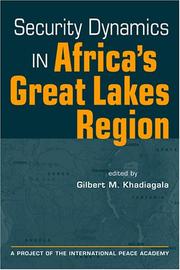
ISBN: 9781588264442 1588264440 158826419X 9781588264190 1685853609 Year: 2006 Publisher: Boulder, Colo. Lynne Rienner
Abstract | Keywords | Export | Availability | Bookmark
 Loading...
Loading...Choose an application
- Reference Manager
- EndNote
- RefWorks (Direct export to RefWorks)
International relations. Foreign policy --- Polemology --- Internal politics --- Congo --- Great Lakes Region [Africa] --- Conflict management --- National security --- Gestion des conflits --- Sécurité nationale --- Great Lakes Region (Africa) --- Grands Lacs, Région des (Afrique) --- Politics and government. --- Politique et gouvernement --- Security dynamics --- Security dynamics. --- Sécurité nationale --- Grands Lacs, Région des (Afrique) --- National security policy --- NSP (National security policy) --- Security policy, National --- Conflict control --- Conflict resolution --- Dispute settlement --- Management of conflict --- Managing conflict --- Government policy --- Greater Lakes Region (Africa) --- Economic policy --- International relations --- Military policy --- Management --- Negotiation --- Problem solving --- Social conflict --- Crisis management
Book
ISBN: 3319581244 3319581236 Year: 2017 Publisher: Cham : Springer International Publishing : Imprint: Palgrave Macmillan,
Abstract | Keywords | Export | Availability | Bookmark
 Loading...
Loading...Choose an application
- Reference Manager
- EndNote
- RefWorks (Direct export to RefWorks)
The book probes major security and governance trends in Africa’s Great Lakes region since the 1990s. It examines political dynamics in key states – Burundi, the DRC, Rwanda, and Uganda – as well as the role of international actors such as the AU, the EU, and the UN, thereby providing a unique perspective on efforts towards regional peace and prosperity. The authors suggest that while the region has made tremendous progress, it faces continuing challenges (including reversals in governance) that threaten future regional security. .
Conflict management --- National security --- Great Lakes Region (Africa) --- Politics and government. --- National security policy --- NSP (National security policy) --- Security policy, National --- Conflict control --- Conflict resolution --- Dispute settlement --- Management of conflict --- Managing conflict --- Government policy --- Greater Lakes Region (Africa) --- Economic policy --- International relations --- Military policy --- Management --- Negotiation --- Problem solving --- Social conflict --- Crisis management --- Africa-Politics and government. --- Political science. --- Security, International. --- Diplomacy. --- Regionalism. --- Economic development. --- African Politics. --- Governance and Government. --- International Security Studies. --- Regional Development. --- Development, Economic --- Economic growth --- Growth, Economic --- Economics --- Statics and dynamics (Social sciences) --- Development economics --- Resource curse --- Human geography --- Nationalism --- Interregionalism --- History --- Collective security --- International security --- Disarmament --- International organization --- Peace --- Administration --- Civil government --- Commonwealth, The --- Government --- Political theory --- Political thought --- Politics --- Science, Political --- Social sciences --- State, The --- Africa—Politics and government. --- Africa
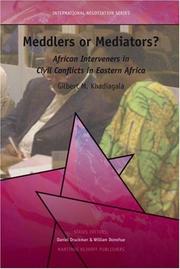
ISSN: 18713319 ISBN: 1281939625 9786611939625 904742221X 9789047422211 9789004163317 900416331X 9781281939623 6611939628 Year: 2007 Volume: v. 4 Publisher: Leiden ; Boston : Martinus Nijhoff,
Abstract | Keywords | Export | Availability | Bookmark
 Loading...
Loading...Choose an application
- Reference Manager
- EndNote
- RefWorks (Direct export to RefWorks)
Since the 1990s, African actors have been engaged in ending civil wars. These efforts have often been characterized as the quest for indigenous solutions to local conflicts.
Conflict management --- Mediation --- International Relations --- Law, Politics & Government --- Good offices (Mediation) --- Dispute resolution (Law) --- Conflict control --- Conflict resolution --- Dispute settlement --- Management of conflict --- Managing conflict --- Management --- Negotiation --- Problem solving --- Social conflict --- Crisis management --- Law and legislation --- Africa, Eastern --- Politics and government --- International relations. Foreign policy --- Polemology --- East Africa
Book
ISBN: 1868148750 1868148777 9781868148776 9781868148752 9781868148745 1868148742 Year: 2015 Publisher: Johannesburg : Wits University Press,
Abstract | Keywords | Export | Availability | Bookmark
 Loading...
Loading...Choose an application
- Reference Manager
- EndNote
- RefWorks (Direct export to RefWorks)
This fifth volume in the New South African Review series takes as its starting point the shock wave emanating from the events at Marikana on 16 August 2012 and how it has reverberated throughout politics and society. Some of the chapters in the volume refer directly to Marikana. In others, the infl uence of that fateful day is pervasive if not direct. Marikana has, for instance, made us look differently at the police and at how order is imposed on society. Monique Marks and David Bruce write that the massacre 'has come to hold a central place in the analysis of policing, and broader political events since 2012'. The chapters highlight a range of current concerns - political, economic and social. David Dickinson's chapter looks at the life of the poor in a township from within. In contrast, the chapter on foreign policy by Garth le Pere analyses South Africa's approach to international relations in the Mandela, Mbeki and Zuma eras. Anthony Turton's account, 'When gold mining ends' is a chilling forecast of an impending environmental catastrophe. Both Devan Pillay and Noor Nieftagodien focus attention on the left and, in different ways, ascribe its rise to a new politics in the wake of Marikana. The essays in NSAR 5: Beyond Marikana present a range of topics and perspectives of interest to general readers, but the book will also be a useful work of reference for students and researchers.
Democracy --- Police shootings --- Labor --- Deadly force used by police --- Police use of deadly force --- Shootings by police --- Use of deadly force by police --- Police patrol --- Suicide by cop --- Labor and laboring classes --- Manpower --- Work --- Working class --- South Africa --- Africa, South --- Politics and government --- Economic policy. --- Economic conditions --- Marikana (Rustenburg, South Africa) --- Foreign relations.
Book
ISBN: 9781776140985 1776140982 9781776140992 1776140990 9781776140558 1776140559 Year: 2018 Publisher: Johannesburg : Wits University Press,
Abstract | Keywords | Export | Availability | Bookmark
 Loading...
Loading...Choose an application
- Reference Manager
- EndNote
- RefWorks (Direct export to RefWorks)
Despite the transition from apartheid to democracy, South Africa is the most unequal country in the world. Its extremes of wealth and poverty undermine intensifying struggles for a better life for all. The wide-ranging essays in this sixth volume of the New South African Review demonstrate how the consequences of inequality extend throughout society and the political economy, crippling the quest for social justice, polarising the politics, skewing economic outcomes and bringing devastating environmental consequences in their wake. Contributors survey the extent and consequences of inequality across fields as diverse as education, disability, agrarian reform, nuclear geography and small towns, and tackle some of the most difficult social, political and economic issues. How has the quest for greater equality affected progressive political discourse? How has inequality reproduced itself, despite best intentions in social policy, to the detriment of the poor and the historically disadvantaged? How have shifts in mining and the financialisation of the economy reshaped the contours of inequality? How does inequality reach into the daily social life of South Africans, and shape the way in which they interact? How does the extent and shape of inequality in South Africa compare with that of other major countries of the global South which themselves are notorious for their extremes of wealth and poverty? South African extremes of inequality reflect increasing inequality globally, and The Crisis of Inequality will speak to all those - general readers, policy makers, researchers and students - who are demanding a more equal world.
South Africa --- Social conditions. --- Politics and government. --- History.
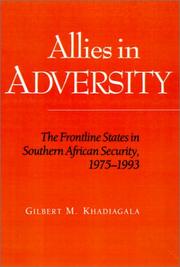
ISBN: 0821410970 Year: 1994 Publisher: Athens : Ohio University Press,
Abstract | Keywords | Export | Availability | Bookmark
 Loading...
Loading...Choose an application
- Reference Manager
- EndNote
- RefWorks (Direct export to RefWorks)
National security --- Africa, Southern --- Politics and government --- Foreign relations
Digital
ISBN: 9783319581231 9783319581248 Year: 2017 Publisher: Cham Palgrave Macmillan
Abstract | Keywords | Export | Availability | Bookmark
 Loading...
Loading...Choose an application
- Reference Manager
- EndNote
- RefWorks (Direct export to RefWorks)
The book probes major security and governance trends in Africa’s Great Lakes region since the 1990s. It examines political dynamics in key states – Burundi, the DRC, Rwanda, and Uganda – as well as the role of international actors such as the AU, the EU, and the UN, thereby providing a unique perspective on efforts towards regional peace and prosperity. The authors suggest that while the region has made tremendous progress, it faces continuing challenges (including reversals in governance) that threaten future regional security. .
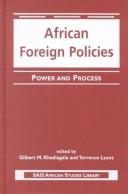
ISBN: 155587990X 1555879667 1685850219 Year: 2001 Publisher: Boulder, Colo. Lynne Rienner Publishers
Abstract | Keywords | Export | Availability | Bookmark
 Loading...
Loading...Choose an application
- Reference Manager
- EndNote
- RefWorks (Direct export to RefWorks)
Geopolitics --- Géopolitique --- Africa --- Afrique --- Foreign relations --- Strategic aspects --- Relations extérieures --- Aspect stratégique --- International relations. Foreign policy
Book
ISBN: 9781868147649 9781868147632 1868147649 Year: 2014 Publisher: Johannesburg : Wits University Press,
Abstract | Keywords | Export | Availability | Bookmark
 Loading...
Loading...Choose an application
- Reference Manager
- EndNote
- RefWorks (Direct export to RefWorks)
The death of Nelson Mandela on 5 December 2013 was in a sense a wake-up call for South Africans, and a time to reflect on what has been achieved since 'those magnificent days in late April 1994' (as the editors of this volume put it) 'when South Africans of all colours voted for the first time in a democratic election'. In a time of recall and reflection it is important to take account, not only of the dramatic events that grip the headlines, but also of other signposts that indicate the shape and characteristics of a society. The New South African Review looks, every year, at some of these signposts, and the essays in this fourth volume of the series again examine and analyse a broad spectrum of issues affecting the country. They tackle topics as diverse as the state of organised labour; food retailing; electricity generation; access to information; civil courage; the school system; and - looking outside the country to its place in the world - South Africa's relationships with north-east Asia, with Israel and with its neighbours in the southern African region. Taken together, these essays give a multidimensional perspective on South Africa's democracy as it turns twenty, and will be of interest to general readers while being particularly useful to students and researchers.
Economic development --- Democracy --- South Africa --- Economic conditions --- Economic policy. --- Social conditions --- Social policy. --- Politics and government
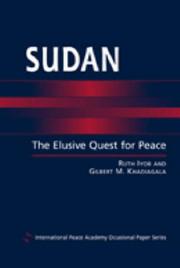
ISBN: 9781588263506 Year: 2006 Publisher: Boulder (Colo.) Rienner
Abstract | Keywords | Export | Availability | Bookmark
 Loading...
Loading...Choose an application
- Reference Manager
- EndNote
- RefWorks (Direct export to RefWorks)
| Listing 1 - 10 of 27 | << page >> |
Sort by
|

 Search
Search Feedback
Feedback About UniCat
About UniCat  Help
Help News
News